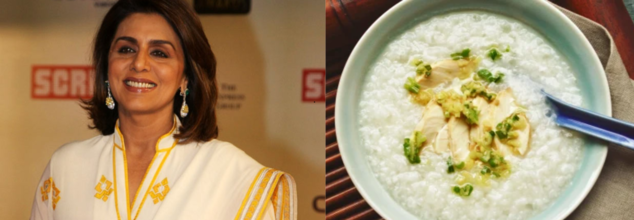- Health Conditions A-Z
- Health & Wellness
- Nutrition
- Fitness
- Health News
- Ayurveda
- Videos
- Medicine A-Z
- Parenting
Why Does Actor Neetu Kapoor Eat Congee For Her Breakfast?

Bollywood Actor Neetu Kapoor, 66, is still fit and slays wherever she goes. In a recent interview with Mira Rajput on her YouTube Channel, Neetu revealed that her secret to fitness is her breakfast, which is Kanji rice.
"Kanji is the best probiotic and always better than having capsules," Neetu said.
"You take a spoon full of cooked rice. In a matki, put water and that cooked rice. Let it ferment overnight. Next morning, take the rice and kanji, put a little tadka and then have it for breakfast," she explained.
Why Is It A Healthy Breakfast?
Kanji or Congee rice is a popular South Indian dish. Many versions of this exists across India, in Bengal, it is called Panta Bhat. It is also a common dish in Odisha, where it is called Pakhala. Other states like Jharkhand, Chhattisgarh, Tripura and Assam too make this breakfast.
When cooked rice is left to ferment overnight, it releases nutrient. The carbohydrates and protein in the rice remain intact, other nutrients including good bacteria, vitamin B, iron and magnesium are released.
Soaking in water also leads to a high retention of water in the dish, which can result positively, if consumed during hot and humid seasons.
This light dish contains good bacteria and probiotics which helps in digestion, and also cools your body down.
Healthy For Gut Health
The key to a healthy gut health is lactobacillus, a kind of probiotic, which helps in digestion, suppression of disease-causing bacteria and treats constipation. It also is beneficial in treating irritable bowel syndrome. It breaks down sugar into lactic acid.
A study by a Bhubaneswar-based professor Balamurugan Ramdas also revealed that this dish contains short-chain fatty acids, which are responsible for improving gut health and boosting immunity. The study also notes that the fermented rice water also provides high energy.
It also has a low glycaemic index that helps maintain a stable blood sugar level, reduces cravings and snacking. The combination of fibre, protein and healthy fats in congee makes it a superfood. Furthermore, it is also easy to cook.
Kanpur Food Adulteration: FSSAI Seizes 14,000L of Oil, 1320Kg Rotten Dates And More Ahead Of Festive Season

Credits: FSSAI and Canva
After Indore's Bhagirathpura food contamination and Horlicks adulteration in Odisha, another news of food adulteration comes from the state of Uttar Pradesh where UP Food Safety and Drug Administration or the UPFSDA with Food Safety and Standards Authority of India or FSSAI seized nearly 14,000 litres of adulterated oils during raids in Kanpur.
This has led to the confiscation of 1,000 kilograms of colored waste and other suspicious food items. This happened right ahead of the festive season like Holi, Eid and as Ramadan continues. This is also the time when festive meals are cooked in oil, ghee, and Ramadan fast is also broken with dates that too were found in rotten conditions.
Also Read: Scientists Develop First Antibodies To Block Epstein Barr Virus
Kanpur Food Contamination: What Has Been Seized In The Raid?

As per the official statement, enforcement teams seized 13,972 litres of adulterated oil and 1,350 of colored waste during inspection across the city.
Officials were also able to spot fake ghee in the manufacturing unit of Kalyanpur. Fake ghee worth approximately Rs. 5.45 lakh were confiscated. The seized samples have been sent to a laboratory for further testing and analysis.
The raids were launched as a part of wider effort to curb food adulteration before the festive season when the demands for such edible also rise sharply.
Kanpur Food Contamination: Dates, Sweets, And More Seized
Surprise inspections were also conducted at several food outlets, cold storage facilities and dairies across Kanpur that brought out a concerning image. These places have come under the scanner. Authorities inspected Swaroop Cold Storage in Aishbagh and Himalayan Cold Storage on Ayodhya Roads. Further raids were carried out on dairies in the Havetmau area and Rae Bareli Road. Samples from sweet shops and other eateiers have also been collected.
The raid collected rotten dates from the cold storage. Followings have been collected and recovered:
- 1,320 kilograms of dates were seized
- 1,418 kilograms of colored kachri were confiscated
- Food items also recovered from warehouse in Aminabad
Officials confirmed that strict actions will be taken against them and this will continue throughout the festive period.
Raids Not Just In Kanpur
FSDA intensified raids and checks in Lucknow too during Ramadan and Holi. These inspections will be done in warehouses, food outlets, and dairy units to prevent sale of adulterated and substandard products. Raids from Hapur too have led to confiscation of adulterated food. UPFSDA plans to conduct further raids during the festive season. On X, formerly Twitter, the UPFSDA posted that it has seized 25,000 kg of Suji (valued at ₹10 Lakhs) from M/s Raj Sneh Agro Foods Pvt Ltd due to packaging regulation violations. Samples of Jaggery Powder, Gur, and Suji have been sent for lab testing.
What Happens To Your Health When You Consume Adulterated Foods?
Food adulteration happens when there is an intentional addition of foreign or inferior substance to original food products. A 2024 study published in SAGE Open Medicine notes various health impact of adulterated food which include:
- Cancer
- Lathyrism
- Liver disease
- Cardiac failure
- Kidney disease
- Nervous system-related diseases
The study also notes that adulteration could also lead to allergic reactions. Pregnant woman, children and elderly are more prone to getting any illness if adulterated food is consumed.
Indore Food Contamination: 6 People Hospitalized In Bhagirathpura

Credits: Canva
Not too long ago, Indore made headlines in water contamination case where a 67-year-old woman, identified as Parvati Bai Kondla also showed signs of Guillain-Barré syndrome. Bacteria like E coli. and Klebsiella were found in the water sample of Bhagirathpura, the epicentre of water contamination.
Indore's Bhagirathpura is again on the news, this time for food contamination.
Also Read: Woman Lost Weight On Mounjaro But Her Breasts Didn't Stop Growing, This Is Why...
Indore Food Contamination: What Happened?
Six people have been admitted to a hospital after they consumed contaminated food in Bhagirathpura. At a birthday party in Bhagirathpura on a late Saturday night, 60 people ate the food and some of them developed health problems. Chief Medical and Health Officer (CMHO) Dr Madhav Hasani stated on Monday.
Bhagirathpura was the epicentre of water contamination that claimed 22 lives earlier. The minister said that affected individuals were treated and as a precaution, six of them were admitted to the Government Maharaja Yashwantrao Hospital.
Indore Municipal Corporation Commissioner Dilip Kumar said, “We have found that in case of the construction of the toilet, no safety tank was constructed beneath it. We are also probing the other lapses.”
As per the official statement, all patients are doing well after the treatment.
Indore Food Contamination: What Happened In Indore Before?
Earlier in January, Mayor Pushyamitra Bhargav reported that due to lapses in civic infrastructure. Investigation revealed that a toilet constructed directly above a main drinking pipeline near a police outpost, without a mandatory safety tank resulted in the sewage mixing with drinking water.
Read: Sewage Mixing With Drinking Water Kills 7 in Madhya Pradesh’s Indore, Over 100 Remain Hospitalized
Speaking to The Indian Express, Indore Municipal Corporation Commissioner Dilip Kumar said, “We have found that in case of the construction of the toilet, no safety tank was constructed beneath it. We are also probing the other lapses.”
What Is E. Coli Bacteria?
Escherichia coli, commonly known as E. coli, refers to a group of bacteria that naturally live in the intestines of humans and animals. Most of these strains are harmless and even play a role in digestion. However, certain types can trigger illness when they enter parts of the body where they do not belong or release harmful toxins.
These disease-causing strains attach themselves to body cells and produce toxins, leading to infection and inflammation.
What Is Guillain-Barré syndrome?
Guillain-Barré syndrome is a rare autoimmune condition in which your immune system attacks your peripheral nerves, leading to symptoms like numbness, tingling, and muscle weakness that progress to paralysis. However, with treatment, most people fully recover from the condition.
Doctors say GBS occurs at any age, but it most commonly affects people between 30 and 50 years of age.
Guillain-Barré syndrome is rare. About 100,000 people worldwide develop GBS every year. To put that into perspective, the world population is about 7.8 billion. That means healthcare providers diagnose GBS in about 1 in 78,000 people each year.
Horlicks Controversy: Why Is This Popularly Branded 'Health' Drink Suddenly Under The Scanner In Odisha

Credits: ANI and Horlicks Website
Branded as a health drink, Horlicks has come under the scanner in Odisha as the government raised alarm over the growing incidence of food adulteration. On Monday, Odisha's Health Minister Mukesh Mahaling revealed that adulterated batches of Horlicks were seized from multiple districts. He raised serious concerns over food safety across the state.
This came in the backdrop of Congress MLA Tara Prasad Bahinipati asking for clarification on reports of food adulteration. The attention was focused on the everyday food products consumed by households.
Also Read: Fact Check: Should You Change Your Underwear In Every 6 Months?
Horlicks Controversy: Adulteration In 'Health' Drink

Mahaling responded to MLA Bahinipati's query in the Assembly and said that batches of Horlicks have been seized from Baugh and Dhenkanal districts. Furthermore, other reports of confiscation also came form Jagatsinghpur and Mayurbhanj.
Officials have conducted inspections and seized suspect stock during routine checks, however, the Minister did not specify the exact quantity of the adulteration involved, neither the nature of adulteration was revealed.
This has triggered concerns among the consumers who are parents of young children and elderly citizens who regularly rely on health drinks like Horlicks for nutritional supplements.
Horlicks Controversy: Adulteration In Other Food Items
The Minister said that adulteration is not just limited to packaged health drinks, but has affected a wide range of commonly consumed food items:
- Chhena
- Curd and milk
- Bread
- Spices
- Chhatua
- Sauces
- Soybeans
- Ghee
- Salt
- Sugar
- Papad
- Chocolate
- Maida
As per the Health Department, some samples were found to contain harmful and toxic substances, and severe levels in Khurda district. The Health Minister said that the department has intensified inspections, raids and enforcement measures to curb the malpractice and safeguard public health.
Read: Bacteria Found in Amul Milk Pouches, Officials Urge Pasteurization
'Health' and 'Nutritional' Drink Controversy Case Study
In 2023-24, a controversy on Bournvita, which is marketed as a health drink began when influencer Revant Himatsingka of Food Pharmer alleged in a viral video that the drink contained excessive sugar, which is approximately 50 per cent by the weight. He also said that the drink contained harmful additives and that it contradicted from the marketing of it as a health drink.
Afterwards, a legal notice was sent to Mondelez-owned Cadbury and Bournvita reduced its added sugar content by 14.4 per cent and faced regulatory orders to remove the "health drink" tag from its packaging.
© 2024 Bennett, Coleman & Company Limited

